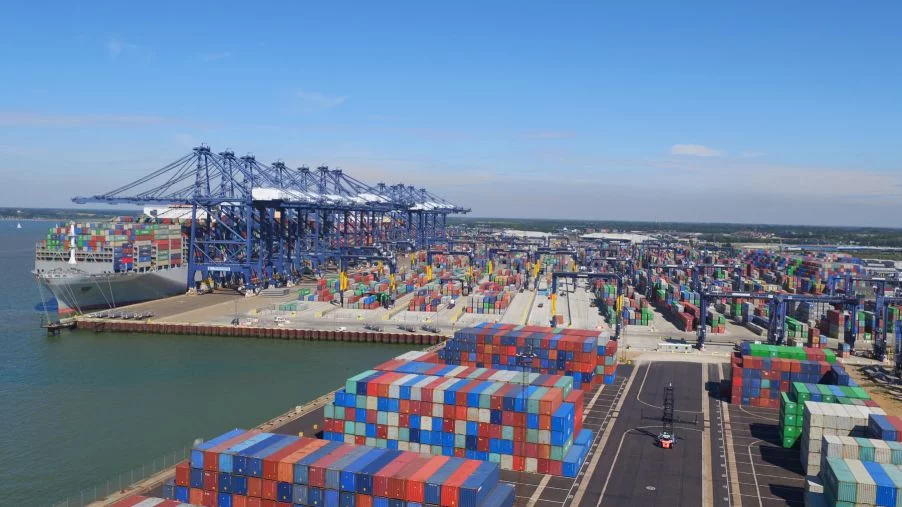Are there clear benefits to the UK logistics sector in the opportunity provided by freeports? Paul Hamblin explains the background – and some of the doubts.
Free ports have become one of the most kicked-about political footballs of our times. Recommended back in 2016 by jubilant Leavers as a future benefit for a newly-sleek Brexit Britain, they continued to grab the headlines this summer as part of the Conservative leadership battle. Both Liz Truss and Rishi Sunak sought headlines on the issue amid the race to replace Boris Johnson at 10 Downing Street – indeed, it was Sunak who came up with the freeports idea as a new MP back in 2014. So we know Britain’s new PM likes them.
So what is a free port and why is the government once again backing them, given that history?
A free port or ‘free zone’ is an area inside a country’s geographic boundary yet legally considered outside the country for customs purposes. Goods brought into the free port don’t face import tariffs (though if they are then sent into the rest of the country for sale, they are then taxed accordingly). Tax breaks for investment can also be introduced. According to the model, manufacturers can also benefit. For instance, rather than paying tariffs on separate components required to be imported from elsewhere, all parts could be transported tariff-free to a free port zone and then assembled within it.
Freeports are successful in many parts of the world – there are roughly 3,500 in over 100 countries – but they are not prevalent within the European Union, largely because EU state aid rules restrict the ‘sweeteners’ in terms of tax breaks and customs help that local or national governments can offer. The opportunity to benefit is simply not as promising as it is in other jurisdictions.
This restriction partly explains why free ports have become such an attractive idea for Brexit-backing politicians in the UK. What better way to establish the country’s hard-won independence – as they see it – than by creating low-tax, low-cost zones that kick-start the freshly charged economy, now released from the stifling regulatory burden of the EU?
Location is another important factor in the highly politicised free ports agenda. The Conservative administration is keen for voters to see a return on its so-called ‘levelling-up’ agenda, by which poorer regions are promised government support to lessen the historic North/South economic divide and enable less-affluent areas ultimately to match England’s wealthier regions.
Freeports: tax and customs benefits
Freeport benefits come under two very broad headings: Tax and Customs. In the model proposed by the UK government, eligible businesses in freeports will enjoy a range of tax incentives not available at a national level, such as enhanced capital allowances, relief from stamp duty and employer national insurance contributions for additional employees.
Customs measures include allowing imports to enter the free port custom sites with simplified customs documentation and a delay in paying tariffs. This means that businesses operating inside designated areas in and around the port may manufacture goods using these imports, before exporting them again without paying the tariffs, while also enjoying the benefit from simplified customs procedures.
Freeports will provide what the government describes as “a supportive planning environment for the development of tax and customs sites through an extension of permitted development rights and incentivising use of local development orders”. With up to 45km of hinterland potentially to develop, the range of possibilities multiplies.
Eligible businesses will have access to a suite of tax reliefs including Business Rates, Stamp Duty Land Tax (SDLT), Employer National Insurance Contributions (NICs), Enhanced Structures and Building Allowance and Enhanced Capital Allowances designed to incentivise new investment within the boundaries of free port ‘tax sites’.
The UK Government also says that the council area in which the free port tax sites are located will be able to retain 100% of the business rates growth above an agreed baseline. This will be guaranteed for 25 years, “giving councils the certainty they need to borrow and to invest in regeneration and infrastructure that will support further growth”.
View from the inside
So much for the theory – is there anything for the UK logistics sector in these packages? For the big players – large multi-national 3PLs and logistics providers – such benefits are likely to be less game-changing, as they already operate on a sophisticated level in terms of making use of existing opportunities.
Tim Morris, CEO of the the UK Major Ports Group, the trade association for the largest port operators, confirms that landside development is seen as a major opportunity for the ports and perhaps also for the smaller logistics operators.
“Smaller companies may well optimise their processes via the direct benefits – such as time and cost savings in customs, as well as indirectly, by being able to access the huge land hub, the so-called ‘glomeration’ effect. If you’re already a 3PL you already know about customs processing, temporary storage, inward processing relief, then you’re already exercising those facilitations and you will want to investigate if the opportunity is materially more beneficial. But as a small operator not used to these things, there’s a definite benefit.”
Morris is mandated to promote free ports by his members, so naturally takes an optimistic view of the wider opportunity. “We are positive about the concept because we already see them working around the world, attracting investment, jobs, boosting trade in those countries, not just in lower-wage, higher-growth environments such as the Middle East but also high-wage economies such as the US East Coast. Many such areas are operated by our members and we think there’s a step-change opportunity here.”
Critics suggest that such environments will lead to a step-change of a less attractive kind as law, employment and safety standards drop to a lowest common-denominator level.
“They portray ‘Wild West’ scenarios,” he protests. “The suggestion is that a barbed wire fence is erected and the site than becomes completely opaque with zero standards. That is factually incorrect. UK ports already operate under a number of different security and standards levels, including in employment and environment as well as those of security. There is nothing in the free port package that in any way weakens those standards. We will still need environmental assessments, we will still be under the oversight of Border Force, HMRC, Police – all of these essentials remain in place. In fact, free port operators have had to make additional commitments to various national and international standards in areas such as bio-security. So higher standards have to be reached to qualify as a free port.”
He argues that there is no agenda to reduce employment standards. “Going further, in Scotland and Wales, bids will have to sign up to higher ‘fair work’ employment standards. We are not anticipating any changes in terms and conditions on people employed at free ports versus non-free ports. It is simply not the reality of the situation we’re in. Minimum wages and working hours standards will remain as they are – and all workforces will remain highly unionised, as they currently are.”
The other main question-mark over the feasibility of freeports hangs over their former quiet exit in 2012. What will the non-EU British freeport offer that its predecessors could not?
“The package of measures, the toolbox, is much more extensive than it previously was,” he says. “Yes, there is some debate about how successful the Liverpool free port of the 1980s and 1990s was, but there is no doubt the package of incentives that the Mersey City Region Freeport can now call upon is much wider. Tax benefits in employment, the acquisition of land for instance. That’s why some of those who let it go in the past – Liverpool, Tilbury, for instance – have come back for another go this time.”
Keen observers will note that the 45km hub offers plenty of scope away from the port itself in such cases. Critics have raised eyebrows that the opportunity to take advantage of laws not available in the wider economy stretches such a long distance from the core activity. Developers can expect to face opposition from local environmental and rural groups given that, to give one example, the fabled beauty of Dartmoor and the South Hams lies well within the scope of the Plymouth free port region.
So far, it is hard to detect a clamour for freeports within the logistics industry itself. Clare Bottle, CEO of the United Kingdom Warehousing Association (UKWA) points out that member are currently far more exercised by continuing labour shortages than any other of the many issues on their agendas. “Free ports are not currently an issue on the doorstep for my members, put it that way,” she says.
Tim Morris points out that the free ports transition will be a slow one, without early newsworthy ‘wins’. “Unfortunately for the politicians, it’s very unlikely we’ll see ribbon-cutting ceremonies set against backgrounds of enormous sheds teeming with people. The transition is a slow one. Look at London’s Canary Wharf – a hugely successful project that has been going for several decades and the building work continues apace, providing jobs, investment and the green transition.”
This time freeports will be different, he predicts. “The package is better and many established players are fully committed to its success.”











